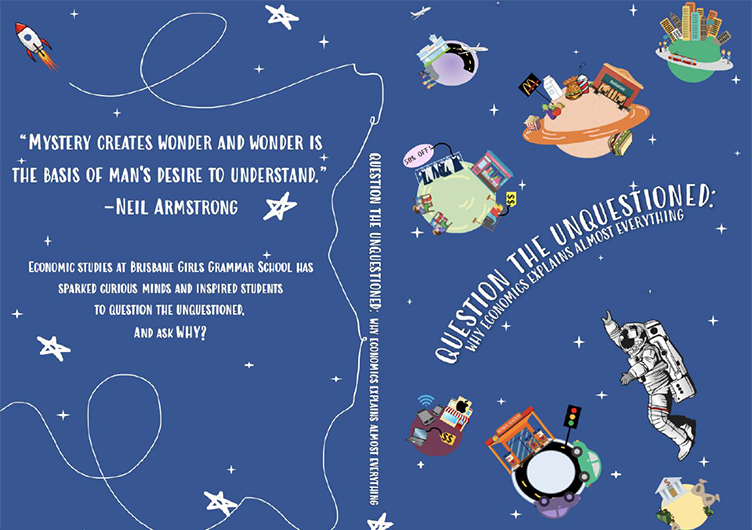For example, our Economics students undertake guided inquiries into contemporary economic issues and policy making, which is relevant to their everyday lives and understanding the logic of human behaviour. Last Term, Year 10 girls explored the inner logic of the world around them in their unit Question the Unquestioned—why Economics explains almost everything. The project has sparked great curiosity in our girls as they raised and probed into a wide range of interesting questions in their life by applying economic analysis. For example, why are there no seat belts on trains? Why does a round pizza come in a square box? Why are fancy expensive meals small and cheap meals large? Why do not all countries drive on the right side of the road?
As part of the project, girls were also tasked with designing a book cover to accompany their assignments. Juliette Harding Bradburn (10B) won the book cover design competition. Her cover, and assignment, Why does the world not use a single currency, is included below.

The winning entry by Juliette Harding Bradburn (10B)
Why does the world not use a single currency?
Juliette Harding Bradburn (10B); Teacher: Dr Sam Peng
In 2020, the United Nations acknowledged that there are 180 different currencies world-wide. It has been considered whether or a not a single international currency would benefit society. For the world to make the rational decision of using a single international currency, the benefits have to outweigh the costs. The international benefits of a single currency would abolish exchange rate fluctuations and encourage tourism. For example, as of 20 March 2020, 1 Australian dollar had an exchange rate of 0.58 United States Dollar (XE Currency Converter, 2020). A single currency system would abolish the exchange rate and consequently benefit the Australian businesses which are trading with the United States or individuals who are travelling overseas. Before money was circulated and currency was exchanged people used bartering as a form of trade. This prehistoric medium of exchange was inconvenient and problematic, and thus eventually evolved into coins which were given a value. Given the potential benefits of an international currency and considering that all money and currency evolved from trade, one can therefore ponder why the world doesn’t have a single currency system.
Firstly, if the world had a singular currency system, governments would suffer the loss of independent monetary policies to regulate national economies. Independent monetary policies allow the path of short-term interest rates to be controlled (Majaski, 2020). If independent monetary policies were abolished, a country could no longer use economic stimulus tactics like lowering interest rates and increasing government spending in order to spark economic growth. These policies are essential to financially stimulate an economy. In 2008, when the United States was confronted by an economic crisis, interest rates were lowered by the Federal Reserve in a successful attempt to stimulate their economy (Chen, 2019). When the economy of Greece collapsed in 2009, sharing a single currency allowed the country to benefit from billions of Euros bailout from Germany so as to avoid bankruptcy. This demonstrates the logical flow on of a single currency system in which all countries sharing one monetary policy would result in policy decisions that would benefit some countries at the expense of others e.g. Greece benefiting at the expense of Germany.
Currently as the world faces COVID-19, multiple economies around the world are in economic crisis and a global recession is imminent. The Australian Newspaper, March 21-22, 2020, outlined how Australia is addressing this economic crisis by ceasing the sale of inflation-linked bonds until mid-May 2020 and the Reserve Bank id launching an unprecedented and unconventional bond-buying program. Additionally, the Australian federal government’s stimulus packages included the Reserve Bank interest rate cut. Therefore, if the world had a single currency system, countries who could face an economic crisis would have no independent monetary policy to help boost the economy to resolve the situation.
Secondly, a single currency system would result in businesses all around the world having to change their prices, overall creating a huge international cost. All nations would have to adapt to a new system which involves converting all prices to the single currency. When the euro was first implemented by The European Monetary Union on January 1, 1999, it took three years for it to be established as an everyday currency. It was also estimated by the British Retailing Consortium that British retailers approximately used 1.7 to 3.5 billion pounds to educate people on how to appropriately use the euro (“BBC News | Single currency | Pros and cons”, 1997). Although the euro is now regarded as eliminating currency exchange in the respective areas, delays in introduction occurred due to the difficulties of converting all participating countries’ original currencies into the euro. This example depicts the complications of multiple nations converting to use a singular currency.
The world does not have a single currency system as countries would lose independent monetary policies, and the large international cost of the world having to change their prices, although, as modern technology evolves, digital or cryptocurrencies currencies such as Bitcoin are becoming more commonly used. In February 2020, it was recorded that approximately 42 million Bitcoin wallets have been set up with more than 7.1 million active bitcoin users (Lielacher, 2020). Some parts of society prefer using these digital currencies as it requires lower transfer fees, has increased fraud protection, and also allows similar international payments resulting in digital currencies being more universal friendly.
In conclusion, it may be possible that in the future, the world will have a single currency and eventually transition to digital currency, but this would require a protracted and difficult period of implementation with some countries likely to benefit at the expense of others. In relation to the content previously stated, it can be assumed that the world does not have a single currency as the costs more than outweigh the benefits.
References
Chen, J. (2019). Inflation. Retrieved 22 March 2020, from https://www.investopedia.com/terms/i/inflation.asp
XE: Convert AUD/USD. Australia Dollar to United States Dollar. (2020). Retrieved 22 March 2020, from https://www.xe.com/currencyconverter/convert/?Amount=1&From=AUD&To=USD
Majaski, C. (2020). Monetary Policy. Retrieved 22 March 2020, from https://www.investopedia.com/terms/t/trilemma.asp
BBC News | Single currency | Pros and cons. (1997). Retrieved 27 March 2020, from http://news.bbc.co.uk/2/hi/special_report/single_currency/25081.stm
Lielacher, A. (2020). How Many People Use Bitcoin in 2020? – Bitcoin Market Journal. Retrieved 27 March 2020, from https://www.bitcoinmarketjournal.com/how-many-people-use-bitcoin/




